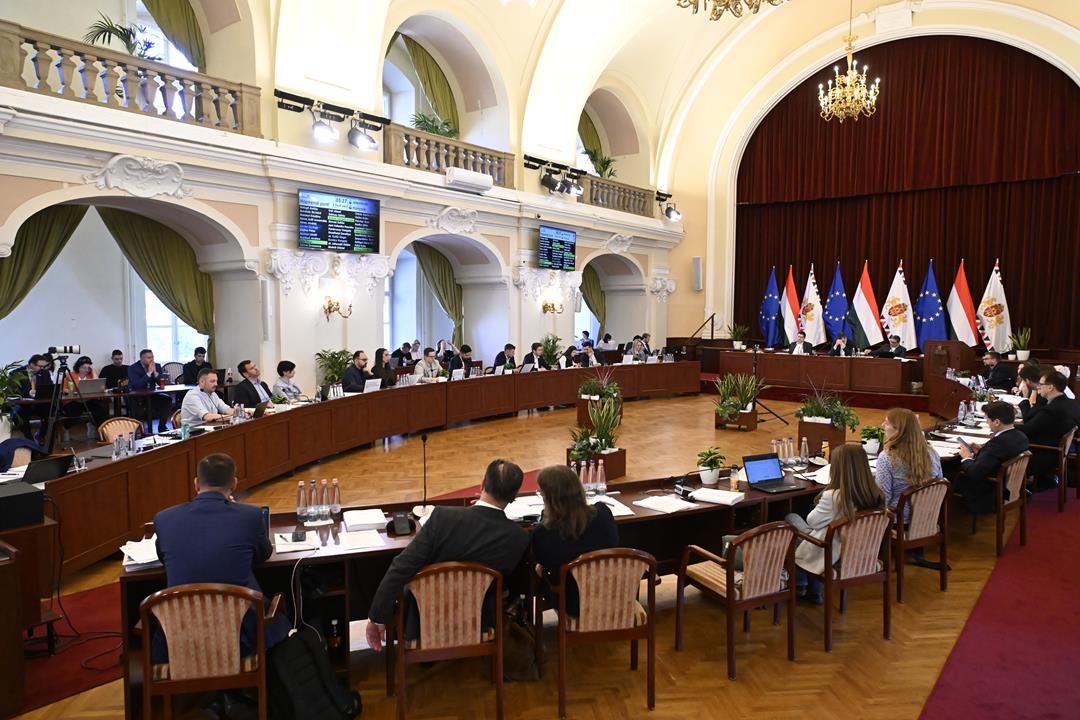Budapest assembly approves theater funding deal, rental apartment construction and panel renovation schemes

The Budapest metropolitan assembly on Wednesday approved an agreement between the city council and the government on funding for theatres.
Budapest Mayor Gergely Karácsony’s proposal on the agreement between the city council and the minister of culture and innovation concerning the joint operation of theatres received unanimous support. Under the agreement that will be in effect until Dec 31, 2029, the central government will finance the operations of seven theatres in the capital, and is required to at least match the funding the metropolitan council allocates towards the upkeep of Budapest-run theatres.
Support needed for survival
The city of Budapest has struck an agreement with the government regarding financial support for the capital’s theatres, Gergely Karácsony, the city’s mayor, said on Tuesday. “Theatres in the capital can breathe a sigh relief: permanent companies are now safe and support for independent theatres will more than double,” the mayor said on Facebook.
He added that the federation of independent theatres (FESZ) will continue to distribute central government support among its members. State support in addition to the city’s contribution of 150 million forints (EUR 370,000) would be enough for independent theatres “to survive”.
Two pilot programs accepted
According to the index.hu, the city assembly approved starting a pilot program to build new rental homes in the capital and reduce rental prices by increasing supply. Furthermore, they also accepted the so-called “Green Panel Renovation Programme” with which they would like to help renew the panel apartments in the districts that join the scheme.

Szentkirályi asks mayor to launch procedure against Tisza’s Kollar
Fidesz’s group leader in the Budapest city assembly, Alexandra Szentkirályi, has asked the city’s mayor to sanction Kinga Kollar, who is both a municipal representative and MEP of the opposition Tisza Party, under rules which ban local government representatives from activity that could undermine the public trust required to carry out their duties, arguing that Kollar had acted against Hungary’s interests in Brussels.
In her speech before the start of the assembly’s business on Wednesday, Szentkirályi insisted that Kollár had forfeited the right to her mandate, saying she had “acted against the interests of the people of Budapest and the Hungarian people”, and had lost the trust of the public.
The Fidesz politician said Kollár had “expressed shame” for being Hungarian and had openly declared in an EP committee meeting that the conditionality procedure under which 21 billion euros of EU funding has been withheld was “a very effective tool” of blackmail against Hungary.
Szentkirályi said that Tisza’s representatives in the capital had openly admitted to holding the view that they benefitted politically “if things are bad for the Hungarian people”.
She said local government representatives had a duty to represent the interests of the community, adding that “a person working in Brussels” who lobbied against her country with a view to denying funding for Hungarian frontline services such as hospitals had no right to a political position.
Szentkirályi then submitted the motion to the mayor, requesting the launch of a procedure against Kollár under the Local Government Act.
In response, Dorottya Keszthelyi of the Democratic Coalition said that central government officials who were effectively blocking EU development funds “should be ashamed of themselves”.
Meanwhile, Dávid Vitézy, the leader of the Podmaniczky Movement grouping, noted that the EU budget period until 2027 began 52 months ago yet Budapest “has not yet received a single forint from the funds”. He urged the assembly to invest in planning from its own resources, arguing that Hungary would regain access to EU funds and the city would be under huge pressure to tap the funds by the funding deadlines.
He insisted that the government was “blocking EU funds that have already been released by the European Commission“.
“Budapest has not received any funds for many years now,” said Vitézy said, turning to Szentkirályi “to take action to ensure that the government releases these funds”.
Regarding the Rákosrendező area of the city, where future property investments depend on clearing dumped waste, he said, he noted that the mayor, Gergely Karácsony, had contacted construction and transport minister János Lázár more than sixty days ago to start negotiations on its development, but to no avail.
At the start of the session, representatives commemorated Pope Francis with a minute’s silence at the behest of Bela Radics of the Fidesz-Christian Democrats.
DK calls for State Audit Office probe of solidarity tax spending collected from local governments
Budapest councillors of the opposition Democratic Coalition (DK) will initiate a State Audit Office probe into how the solidarity tax paid by municipalities has been spent, the head of DK’s group of deputies in the Budapest city assembly said before Wednesday’s meeting.
Sándor Szaniszló, who is also mayor of the capital’s 18th district, said the government was withdrawing more and more money from cities it considered as well-to-do. The district had to pay 11 billion forints in solidarity tax over five years, and the government has taken 208 billion forints from the capital, he said, adding that the capital’s day-to-day operations were being put at risk.
Under the law, the solidarity tax is meant to be spent on supporting underdeveloped regions, the DK politician said. But, he added, no data was available to prove this is how the money had been spent, so DK wants the mayor of Budapest to ask the State Audit Office to investigate how the solidarity tax has been paid to municipalities in need and publish the relevant data.
Read also:







